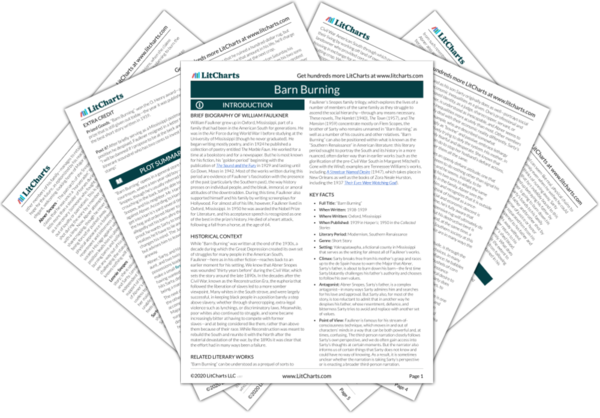The Snopes family is entirely dependent on their landowners for their livelihood, but Abner Snopes constantly tries to assert his own independence anyway—even when that involves bending the wills of the other members of his family, too, to his own desires. Abner deeply resents having to work for other men to support his family, and many of his defiant actions, his lack of concern towards the rules and regulations of others, can be understood as stemming from such resentment. Yet even while asserting independence, Abner also appeals to other systems, such as the courts, becoming dependent on them at the same time as he refuses to play entirely by their rules.
Justice, then, plays an ambivalent role for the Snopes family, even as ten-year-old Sarty—watching his father as well as the other characters in the story—struggles to determine what “justice” might mean for him. Abner’s activities entangle his family, and Sarty in particular, in so many court proceedings that Sarty—who is eventually able to recognize any judge by his formal, bespectacled appearance—has trouble keeping them straight. Indeed, at one point Sarty confuses one trial with another, and as he and his father enter the courtroom, begins defending his father against the charge of burning a barn—when, in fact, it’s his father who is suing Major de Spain.
Abner may appeal to official court-sanctioned justice just as often as other people make formal complaints against him—but when justice doesn’t go his way, he’s willing to disregard what he’s told and claim independence once again. When a judge tells him he’ll owe ten bushels of October corn to Mr. de Spain, for instance, he tells his son that they’ll just wait until October and then see. Once again, Sarty seems to want to support his father even as he possesses a distinct, more innate sense of justice. It’s Sarty, for instance, who objects to the fact that his father appears to be planning to burn the de Spain barn without sending a man ahead to warn the de Spains, like he did the last time. And it’s Sarty who ultimately warns the Major as a result. But it is as a consequence of what Sarty understands to be justice that his father and brother (presumably) are shot—in the Major’s own form of vigilante justice. In the stuffy courtroom, verdicts can often seem unfair; yet as Sarty learns, the apparently independent system outside it turns out to function along an even more unpredictable logic of individual “justice.”
Independence and Justice ThemeTracker

Independence and Justice Quotes in Barn Burning
He could not see the table where the Justice sat and before which his father and his father’s enemy (our enemy he thought in that despair, ourn! mine and him both! He’s my father!) stood.
Maybe he even won’t collect the twenty bushels. Maybe it will all add up and balance and vanish—corn, rug, fire; the terror and grief, the being pulled two ways like between two teams of horses—gone, done with for ever and ever.
He saw the man in spectacles sitting at the plank table and he did not need to be told this was a Justice of the Peace; he sent one glare of fierce, exultant partisan defiance at the man in collar and cravat now, whom he had seen but twice before in his life, who wore on his face an expression not of rage but of amazed unbelief which the boy could not have known was at the incredible circumstance of being sued by one of his own tenants.
“Ain’t you going to even send a nigger?” he cried. At least you sent a nigger before!”
But there was no glare behind him now and he sat now, his back toward what he had called home for four days anyhow, his face toward the dark woods which he would enter when breath was strong again, small, shaking steadily in the chill darkness, hugging himself into the remainder of his thin, rotten shirt, the grief and despair now no longer terror and fear but just grief and despair. Father. My father, he thought.
















